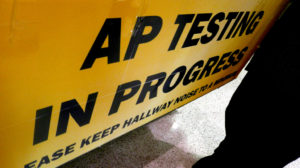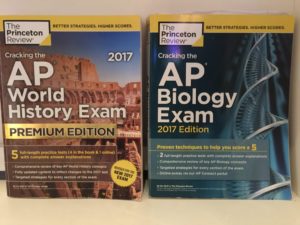The Advanced Placement (AP) classes began to take off in the early 1950s when we saw a need for a higher education. These high school classes are college-level courses that challenge students with a rigorous curriculum. Aiming for excellence in education, the AP program distinguishes academically talented students and gives them a sense of what a college class looks like. At the end of the course, the AP exams for college credit are taken.
The difference between a regular high school course and an AP course is quite significant. In terms of speed, the final exam for an AP class is about a month and a half earlier than a final for a non-AP class; the AP tests are given at the same day and time worldwide. In terms of curriculum, it is much more in-depth, and the content is substantial. Mrs. Grace Kim, both chemistry and AP Chemistry teacher, tells us about this drastic distinction.
AP Chemistry
As one of the hardest AP classes at the high school, AP Chemistry is more conceptual in its content. This course is unique to other AP courses due to the fact that preparation for the AP test occurs so early in the year. From the beginning of the first semester to March, Mrs. Kim finished teaching the curriculum and gave her first review test. “The key to success in AP Chemistry is making sure you know all the chapters and that you follow my review plan,” she says. Another unique aspect of the course is that the homework is optional. “Although the homework is voluntary, I always tell my students to prepare chapter by chapter and to make sure they know what they’re doing,” she suggests.
AP Testing
 During the first two weeks of May, high schools across the nation proctor the AP tests for these courses. An AP exam has a very specific purpose in terms of how it is grading a student. If students pass, they receive college credit to satisfy certain requirements in college. This gives students a head-start in their degree, as well as a weighted GPA in high school.
During the first two weeks of May, high schools across the nation proctor the AP tests for these courses. An AP exam has a very specific purpose in terms of how it is grading a student. If students pass, they receive college credit to satisfy certain requirements in college. This gives students a head-start in their degree, as well as a weighted GPA in high school.
The grading scale for these exams is a 1 to 5 scale, with a 5 being extremely qualified and a 1 being not at all qualified. A 3, 4, or 5 passes for college credit at most universities. This scaled score is derived from a composite score, which is calculated by the total raw points you scored. For most tests, these scores are calculated from both a multiple choice and free response portion of each test.
The following AP exams took place this past week:
- Monday, May 1 – AP Chemistry, AP Environmental Science, AP Psychology
- Tuesday, May 2 – AP Computer Science, AP Spanish Language, AP Physics 1
- Wednesday, May 3 – AP English Literature, AP Physics 2
- Thursday, May 4 – AP U.S. Government
- Friday, May 5 – AP U.S. History, AP Studio Art
Many of these AP exams are accompanied by classes; however, Coronado High does not offer all the AP courses for the tests that are offered. Senior Shannon Ruef has risen to the challenge of taking thirteen AP exams this year (twenty-five total) that she is independently studying for. Students can buy the review books, usually about two inches thick, to study for the exams, which is exactly Shannon’s strategy.
Study Tips
After asking students for study tips, a variety of answers and ways to study surfaced. First, it is essential to get plenty of sleep the entire week of testing to walk in with a clear and sound mind. Many people buy the study books online, which serves as a guide while studying. Sophomore Tina Vo says, “When I use the study books, I break it up into sections. For AP World History, I studied ten pages each day over the course of 30 days.” With this strategy, she was able to designate a certain amount of time each day to studying for each AP.
Many students and teachers would not recommend the notorious “cramming the night before,” but Junior Stefany James decides that it is not such a bad idea. “There are some tests where it is a good idea to look at formulas, for example, three nights before and all the way up to the morning of the exam to memorize them,” she says. “If you never learned them during the year, it is a good idea to study them the night before to have them in your short-term memory.”
During the test, students have found that it is important to pace yourself. In order to cover all the ground in these long exams, it is better to go through the entire test. This allows students to answer all the content they do know and not waste time on questions they are stuck on.
Overall, students should maximize the use of the resources they have available to them and use time wisely.
Next Week’s AP Testing Schedule
- Monday, May 8 – AP Biology, AP Music Theory, AP Physics C Mechanics/Electricity and Magnetism
- Tuesday, May 9 – AP Calculus AB, AP Calculus BC, AP French Language
- Wednesday, May 10 – AP English Language, AP Macroeconomics
- Thursday, May 11 – AP World History, AP Statistics
- Friday, May 12 – AP Microeconomics, AP European History
We are wishing all of the AP students luck, calmness, and success during testing week.






